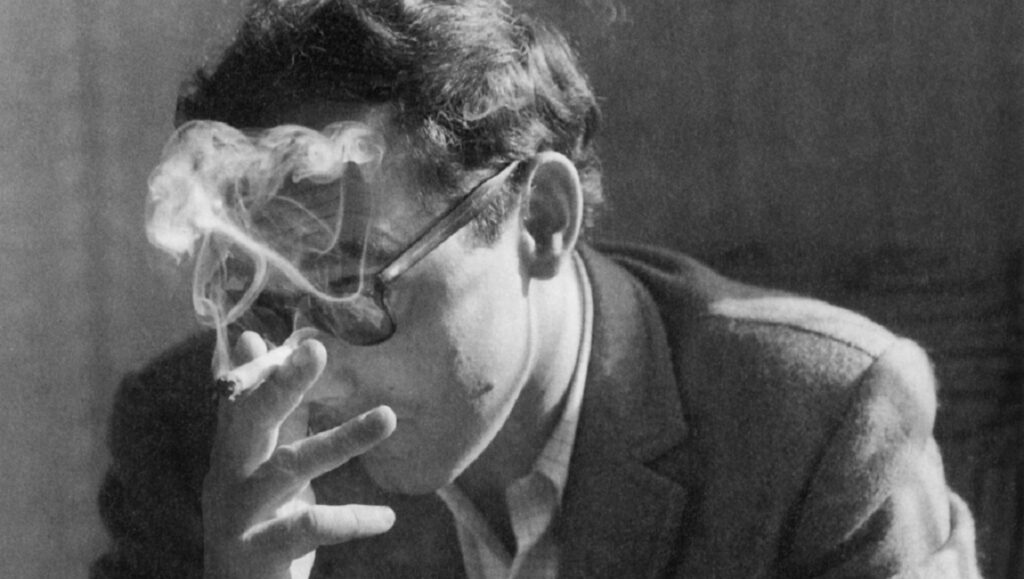There’s a pretty standard axiom about “knowing your audience” when it comes to writing; or in this case, documenting a renowned filmmaker. Cyril Leuthy’s Godard Cinema, completed in 2022 but being released now as part of a double feature with Godard’s own posthumous short, Trailer of a Film That Will Never Exist: Phony Wars, never satisfactorily answers that simple question. Audiences already familiar with Godard’s massive, even unwieldy, and always challenging oeuvre likely won’t learn anything they didn’t already know, while the uninitiated receive only a CliffsNotes version of that same body of work. Indeed, in trying to cover all of Godard’s life and work in a mere 100 minutes, Leuthy inadvertently flattens everything into an easy-to-digest narrative. Godard Cinema obfuscates as much as it elucidates, perfunctorily skimming over world-historic events in a rush to get to the next milestone. One can imagine an entirely different documentary made up exclusively out of what this one leaves out; even attempting to use the film as a simple pedagogic tool for students would require ample addendums to accompany it, lest one be left with an incomplete understanding of Godard’s life and times.
Proceeding in largely chronological order, Godard Cinema gives some brief biographical details about the director’s childhood and adolescence, before jumping head-first into the New Wave era. Clips from Breathless accompany Godard’s own meteoric rise to celebrity filmmaker, an accurate enough sketch of the time. But issues begin arising only a few minutes into the film; talking heads pontificating about Godard’s self-reflexivity use the theoretical language of Brecht without ever actually naming him; likewise, a brief explanation of auteurism doesn’t bother to name Ford, Hawks, or Hitchcock, nor does a brief overview of the Cahier du Cinéma group mention Bazin or any filmmakers other than Godard and (very briefly) Truffaut. There are archival images of Rivette, Chabrol, and Rohmer, and even a clip from Breathless featuring (New Wave-adjacent) Jean-Pierre Melville, but none of them are named (and forget about the Left Bank figures). Actress Macha Méril inadvertently sets the tone when she says in an interview that Godard “was the New Wave.” He might have been the most famous, and was certainly the flashiest, but he was hardly alone at the vanguard; meanwhile, a long aside about the Nouvelle Vague being the first “modern” films to usher in cinema as a fully-fledged art form is in fact totally ahistorical and goes against the very thing the Cahier critics were trying to accomplish. More interviews follow, including Marina Vlady (star of 2 or 3 Things I Know About Her), Christophe Bourseiller, Thierry Jousse, and in a bizarre stylistic gambit, actresses reciting writings by Anna Karina and Anne Wiazemsky in lieu of actual footage or recordings. There’s valuable information here, but the documentary careens through protests against the sacking of Henri Langlois and the French government attempting to revamp the Cinémathèque Française (the only time this towering figure is mentioned), the events of May ‘68, and the shutting down of that year’s Cannes Film Festival by Godard and others. Leuthy clearly, and fairly, articulates Godard’s increasing disillusionment with commercial filmmaking, leading to the creation of the Dziga Vertov Group. However, it’s another missed opportunity to go against received critical wisdom, as Luethy ultimately dismisses the films as failures that have “disappeared from circulation” and characterizes collaborator Jean-Pierre Gorin as an interlocutor who leads to the break-up of Godard and Wiazemsky. In point of fact, the Dziga Vertov films have been available for a few years now, giving anyone who cares to sample them ample opportunity to see the works for themselves.
As in Godard’s real life, the main rupture in the film occurs after Jean-Luc survives a serious motorcycle accident. It’s here that he reinvents himself, thanks to a newfound devotion to video technology and the presence of a new partner in life and work, Anne-Marie Miéville. Leuthy does an adequate job introducing Anne-Marie into the proceedings, affording her a certain amount of prominence. But this, too, is short-lived, as the film quickly reverts back to lionizing Godard, the individual, not a partner in an ongoing conversation with another artist. Godard Cinema at least dares to broach the fact that Godard was misogynistic, and was emotionally (and possibly physically) abusive to Karina. But like everything else here, the idea is introduced and then quickly moved on from. The final straw is the inclusion of the massive Histoire(s) du Cinema project as the grand, culminating event in Godard’s career. It’s a major work, of course, but Leuthy ends the film on a false supposition; noting the coincidence that Histoire(s) was completed in 1998, or nearly a century after the birth of cinema, the film then simply ends. A brief coda shows equipment being boxed up and Godard’s archives being donated, a kind of pat metaphor for the end of a career (and life, as the case may be). But, of course, Godard produced work for a full two decades after he finished Histoire(s), and Godard Cinema makes no mention whatsoever of the period from Eloge de l’amour in 2001 to Le Livre d’Image in 2018, not to mention something like a dozen short video works and installation pieces. It’s as if Leuthy is killing Godard twenty years too early, a severe abdication of responsibility in this viewer’s opinion. To be fair to Leuthy, whatever the film’s myriad faults, it is at least a good-faith effort to document a long, difficult career. But the omissions are too great to ignore, and viewers are ultimately left with only a shallow, greatest-hits-style PowerPoint-esque presentation. Godard famously declared that the best way to criticize a film was to make another film; one wonders if Leuthy’s ineffectual tribute will inspire something more in keeping with Godard’s iconoclastic ethos.
DIRECTOR: Cyril Leuthy; CAST: —; DISTRIBUTOR: Kino Lorber; IN THEATERS: December 15; RUNTIME: 1 hr. 40 min.


Comments are closed.